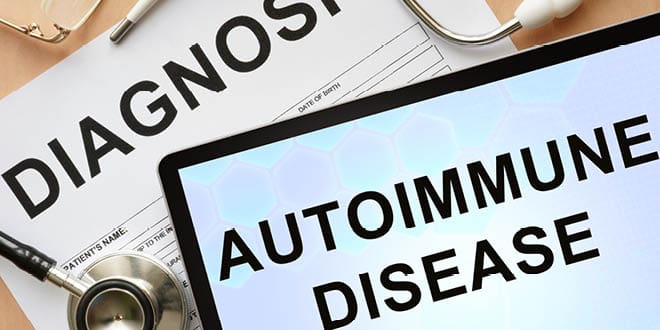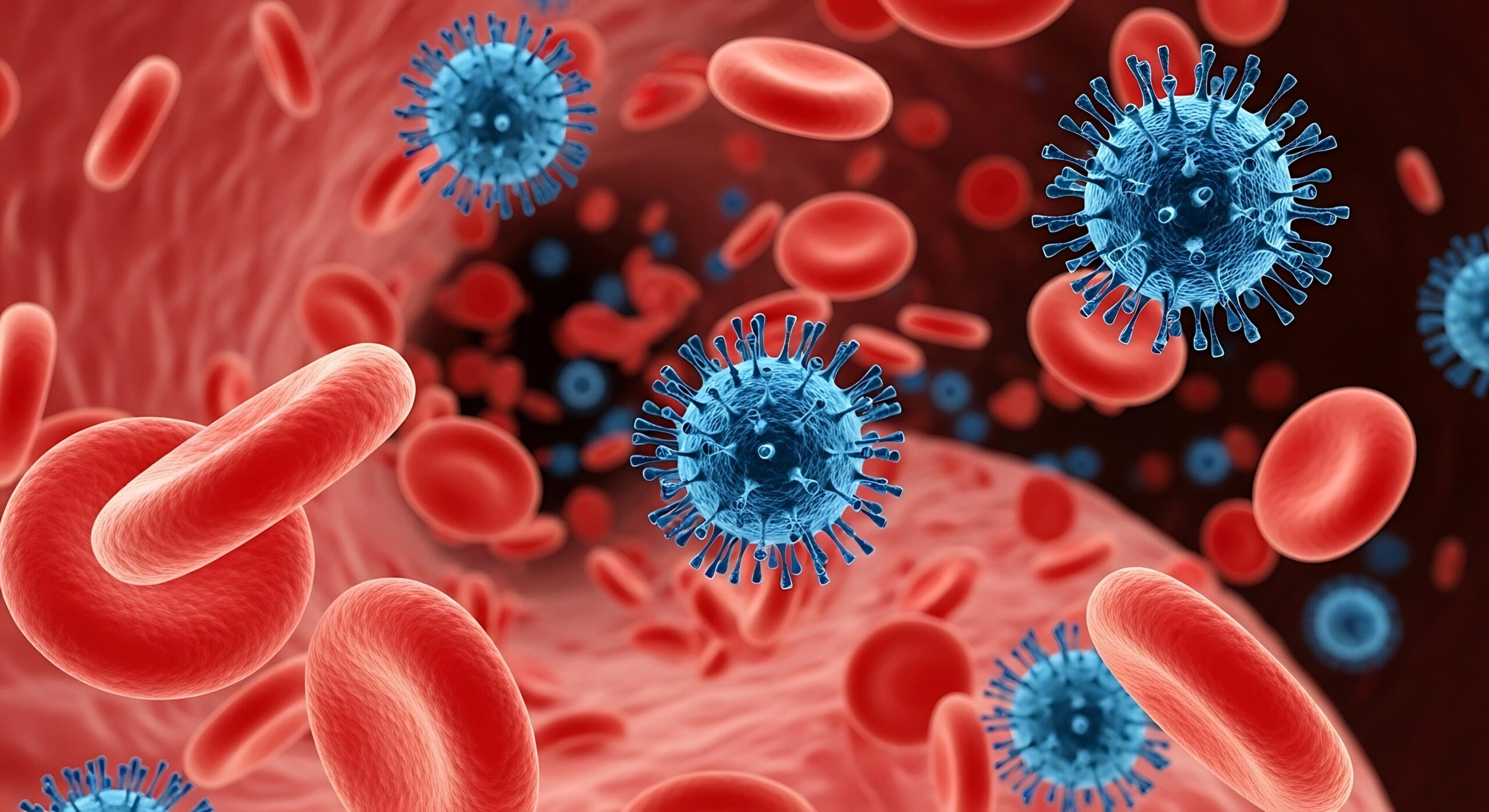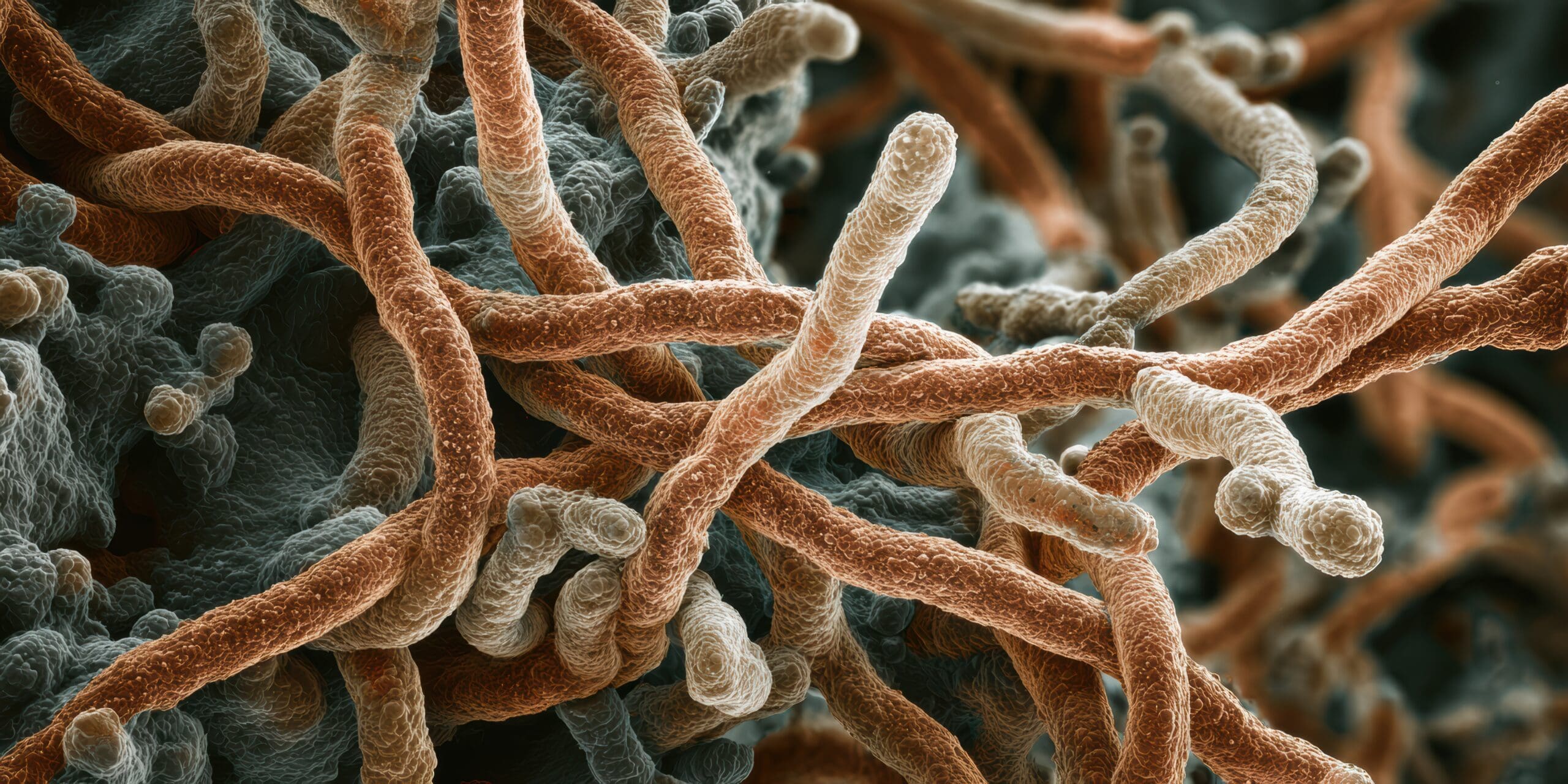The short answer is several things. Firstly, you cannot develop an autoimmune disease unless you have specific genes. The tendency to develop an autoimmune disease runs in families. You won’t necessarily develop the same autoimmune disease that someone in your family has; you just inherit an increased chance of developing one of them.
Just having the genes isn’t enough though. You need to be exposed to one or more environmental factors that trigger off the disease. Environmental triggers include things like an infection, specific foods that your body can’t tolerate, emotional stress, exposure to chemicals or toxic metals; pregnancy, a nutrient deficiency and others. The third critical component is a leaky gut (also known as increased intestinal permeability).
So, you need the genes for autoimmunity, you need to have a leaky gut and then you need an environmental trigger to start off the disease process.
A range of different environmental chemicals have been linked to the development of autoimmune disease
This is not surprising, considering our planet is becoming more polluted and the range of toxins we are exposed to on a daily basis is growing. Studies have shown that people who live near airports and people exposed to toxins in their profession (e.g. printing and painting) are more likely to develop an autoimmune disease.
Genetics
A number of genes have been found to be associated with specific autoimmune diseases. Most autoimmune diseases are the result of several faulty genes; not just one gene. Very rarely in medicine is a disease the result of one specific gene mutation. Examples of those include cystic fibrosis and sickle cell anaemia. Most diseases, including autoimmune diseases are the result of several genes, which must then be activated by an environmental agent.
Even if you know you’ve got faulty genes because there’s a strong history of autoimmune disease in your family, it is not inevitable that you’ll also develop one. Research shows that 70 to 95 percent of the risk of developing autoimmune disease comes from your environment, not your genes. By environment we mean your diet, your lifestyle, the chemicals you are exposed to and the emotions you experience.
This is wonderful news because it means your genes are not your destiny.
You have so much power and control over what you eat and how you live your life, and this will determine whether dodgy genes you’ve inherited will become activated or not. Even if you already have one or more autoimmune conditions, at the very least you can reduce their severity, arrest their progression and, at best, you can reverse the disease.
Is it worth getting a genetic test?
In most cases, no. It is important to remember that this field of medicine is still in its infancy. We are only scratching the surface; new gene mutations are continually being discovered. According to Professor Alessio Fasano, a leading researcher into autoimmune disease, “The more you search, the more genes come out”. For example, in the case of systemic lupus erythematosus, so far 24 genes have been associated with the disease. A combination of genetic mutations predisposes an individual to a specific autoimmune disease.
Having a gene test might be interesting, and it might give you clues to which other autoimmune diseases you could develop. However, the underlying treatment of improving immune health, gut health and liver health that we’ve described in the book, “Healing Autoimmune Disease“, will be the same.
Having said that, there may be benefits to having a blood test for the coeliac disease genes. We already recommend that everyone with an autoimmune disease avoids gluten, but having these genes means you would need to avoid gluten very strictly for life.
Any doctor can order the coeliac gene test for you and it isn’t expensive.
Infections
Infections are a very common trigger of autoimmune disease, and they can also cause a flare up of an existing autoimmune disease. There is a great deal of medical research to support this fact. Infection with certain bacteria, viruses, fungi or parasites doesn’t cause an autoimmune disease directly, like a virus causes the flu. Instead, these infections are more like the straw that broke the camel’s back. They trigger the development of an autoimmune disease in a person who was at high risk of it happening sooner or later.
Certain infections have been linked with specific autoimmune diseases.
This is probably because certain viruses or bacteria closely resemble specific parts of the human body. Therefore after making antibodies against a specific bug; your immune system gets confused and starts making antibodies against your own body. This phenomenon is known as molecular mimicry and is a leading theory as to why autoimmune disease happens in the first place.
As we travel through life we are exposed to more and more infections; this, coupled with nutrient deficiencies and stress, can make autoimmune disease more likely to develop as we get older.
There are good and bad infections when it comes to autoimmune disease. Some infections are actually known to have a protective role, and it also depends on when you become infected. Infection with the stomach bacterium Helicobacter pylori in childhood can reduce the risk of autoimmune disease, while infection in adulthood may raise the risk.
You have probably heard of the hygiene hypothesis. This theory states that exposure to certain bugs and microbes in childhood reduces the risk of allergies and autoimmune disease in adulthood. Children who grow up with pets or grow up on farms and are exposed to dirt usually suffer less allergies and autoimmune disease in adulthood.
Some studies have been carried out on the use of hookworms in people with inflammatory bowel disease and coeliac disease with very positive results. Research participants were given capsules to swallow that contained worm eggs, and then had their inflammatory bowel disease or coeliac disease monitored. Results of these studies were overwhelmingly positive; the worms dampened down excessive inflammation and balanced the immune system. In some instances, people with coeliac disease did not experience any harmful consequences from eating gluten while they had hookworms in their intestines.
We don’t suggest you start eating dirt or stop worming your pets, as you may acquire a harmful gut parasite that worsens your health problems. Instead, this highlights the significance of the gastrointestinal tract in autoimmune disease. You can get similar benefits from including probiotic rich foods such as fermented vegetables in your diet regularly. The good bacteria help to regulate and calm down an overactive immune system.
You can’t prevent yourself from ever catching an infection. The types of infections linked with autoimmune disease are common infections that nearly everyone gets exposed to. It is far more important to strengthen your immune system with a healthy diet and the right nutrients in order to overcome these infections
Chronic infections that linger in your body and continually irritate your immune system are the worst at triggering autoimmune disease.
Chronic infections and autoimmune disease
Any persistent infections can also raise the risk of autoimmune disease in susceptible people. These are subtle, long term infections that may produce very few symptoms, therefore they typically go undetected and untreated. These infections can be bacterial, viral, parasitic or fungal. The infective agent can be present in your body in low numbers, therefore doesn’t produce obvious symptoms. These infections can be hidden in various locations of the body, such as the sinuses, gums, bladder, gastrointestinal tract, uterus or other areas.
These infections can chronically stimulate your immune system, producing low grade inflammation. The toxins released by these bugs also weaken your immune system and can make you feel generally unwell. Common symptoms of low grade infections include fatigue, aches and pains, foggy head, low mood, poor quality sleep (particularly feeling too hot or alternating between feeling too hot and too cold), and unrefreshing sleep. Again, the most effective way to address these chronic infections is to strengthen your immune system.
Heavy metals
There is good evidence that heavy metals can trigger autoimmune disease, particularly aluminium, mercury, lead and gold. Exposure to toxic levels of heavy metals is very common in today’s world and they come from a variety of sources.
Silicone
Silicone is another chemical that may trigger autoimmune disease. When most people think of silicone, they think of breast implants. This is certainly a very common use for silicone, but it is also used in medical tubing, as a component of joint replacements, and it is even used in cosmetic fillers that can be injected into your face to reduce the signs of ageing.
It was originally thought that silicone is an inert substance, with no effects on the immune system, but we now know that having silicone in your body can trigger a powerful immune response. Silicone increases proliferation of a type of immune cell called TH17 cells. These cells can create a great deal of inflammation and tissue damage in autoimmune disease.
Vaccinations
The issue of autoimmune disease being triggered by vaccinations is a very controversial topic, however there are many well documented cases of specific autoimmune diseases resulting from specific vaccinations.
Bisphenol A (BPA)
Bisphenol A is a chemical used in the manufacture of polycarbonate plastic. It is present in a wide range of commonly used items such as plastic containers, utensils, toys, water bottles, the inner lining of some food cans, plastic lids of disposable coffee cups (and the inner lining of paper coffee cups); and it is even found in sales receipts. BPA has been shown to leach out of products, and high levels have been identified in human tissue samples. In fact, research has shown that more than 90 percent of the US population has detectable levels in their urine.
It has been known for a long time that bisphenol A is an endocrine disruptor. That means it disrupts the hormone balance in the body. It has particularly adverse effects on the sex hormones (estrogen and testosterone), as well as thyroid hormones. Very recent studies have shown that BPA affects the immune system in a number of harmful ways, and may raise the risk of developing an autoimmune disease, or aggravating an existing disease. Specifically, it stimulates production of the same inflammatory immune chemicals that other environmental toxins such as silicone and vaccinations induce.
At this stage, there is no research linking bisphenol A to specific autoimmune diseases. If you have an autoimmune disease, it is best to limit your exposure to plastic as much as possible. Try to store food and water in glass or stainless steel containers, and especially avoid heating foods or liquids in plastic containers.
Cigarettes
Most people don’t associate smoking cigarettes with the development of autoimmune disease, however smokers are more likely to develop rheumatoid arthritis, lupus, inflammatory bowel disease and Graves’ disease. Smoking changes the structure of some proteins in the lungs, which your immune system then won’t recognise as your own. In some genetically predisposed individuals, this can cause the development of Goodpasture syndrome. This is a rare but serious disease that can cause bleeding in the lungs, as well as kidney failure.
Smokers tend to respond poorly to treatment for their autoimmune disease compared to non-smokers.
Drugs/medication
There are several medications that can trigger autoimmune disease in genetically susceptible people. The most well known case is drug induced lupus, however autoimmune hepatitis, ulcerative colitis and other autoimmune diseases may be triggered by drugs.
Stress
Intense stress or long term stress has an extremely harmful effect on the immune system. Many people associate the beginning of their autoimmune disease with a stressful life incident. Stress is never the sole factor responsible for the development of a disease though; rather it just promotes the start of something you were prone to getting anyway. A stressful life episode may trigger the initial development of an autoimmune disease, and it is a common cause of a flare up in people living with autoimmune disease.
Leaky gut syndrome
As you can see, there are many different contributors to the development of autoimmune disease. Apart from genetics, the second biggest factor determining whether you’ll develop autoimmune disease or not is leaky gut syndrome. The more technical name for this condition is increased intestinal permeability, and it means just that; the intestinal lining has become more permeable than it should be. This is a problem because it allows wastes and toxins inside the intestines to get into your bloodstream, while also impairing the proper absorption of nutrients into your bloodstream.
Professor Alessio Fasano is a paediatric gastroenterologist and a world leader in research on leaky gut and its relationship to autoimmune disease. According to Professor Fasano, a leaky gut is necessary but not sufficient to develop an autoimmune disease. That means you can’t get an autoimmune disease unless you have a leaky gut.
Find out more by reading “Healing Autoimmune Disease – a plan to help your immune system and reduce inflammation“.









Leave A Comment